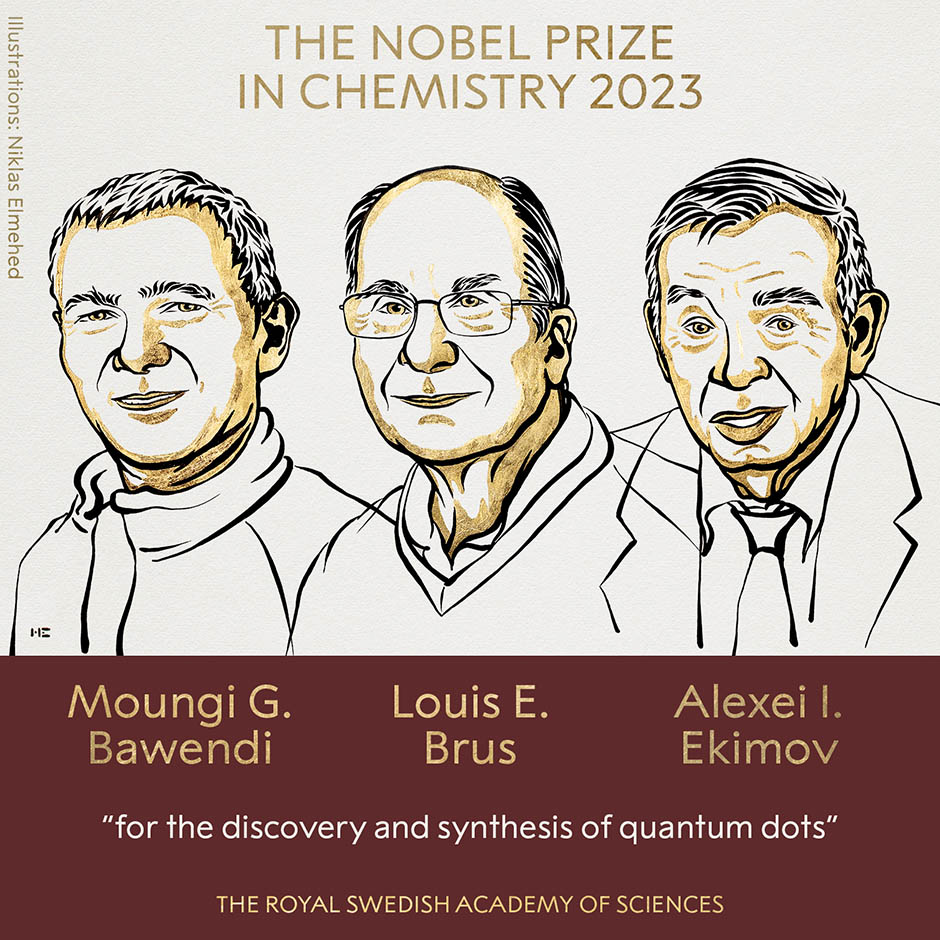The world applauds as the Nobel Prize in Chemistry 2023 is awarded for the discovery of quantum dots. Within this celebration, ICN2’s own Prof. Javier Rodríguez-Viejo, a collaborator of laureate Moungi G. Bawendi at MIT, reflects on their pioneering journey.

Today, the Royal Swedish Academy of Sciences proudly announced the conferral of the Nobel Prize in Chemistry 2023 to Moungi G. Bawendi of the Massachusetts Institute of Technology (MIT), Louis E. Brus of Columbia University, and Alexei I. Ekimov of Nanocrystals Technology Inc. This prestigious award honours their groundbreaking discovery and synthesis of quantum dots, marking the dawn of an innovative era in nanotechnology.
The Nobel Laureates have been recognised for their pioneering work on quantum dots, minute nanoparticles whose properties are intricately dictated by their size. This discovery has unleashed a plethora of applications, ranging from the brilliance of QLED technology to the precision of biological tissue mapping, illuminating the nuanced interplay of quantum phenomena at the nanoscale.
Within the intricate fabric of this pioneering research, a connection emerges to ICN2. Prof. Javier Rodríguez-Viejo, a UAB Professor and Group Leader of the ICN2 Thermal Properties of Nanoscale Materials Group, refined his expertise at MIT after obtaining his PhD in 1992, collaborating closely with Prof. Bawendi and his group in the development of those tiny nanoparticles. "Prof. Klavs F. Jensen was my supervisor at MIT. Working in Prof. Moungi G. Bawendi’s lab we were aware that we were part of something momentous", he reminisces. "Bawendi’s methodology to synthesize these nanoparticles, characterized by their intense light emission, was revolutionary".
Currently at ICN2, Prof. Rodríguez-Viejo is immersed in unraveling the thermal properties of nanoscale materials, an exploration that resonates with the Nobel-recognised research. "Although my current focus has veered, I was part of the team capturing the inaugural images of these very bright nanoparticles", he shares.
On the other hand, the ICN2 Nanobioelectronics and Biosensors Group, led by ICREA Prof. Arben Merkoçi, is a pioneer in merging quantum dots (QDs) with biosensor technology. They've focused on the design of new QDs-based biosensors taking advantages of their optical signals, enhancing electronic/catalytic properties of QDs-based nanocomposites, and fabricating low-cost biosensors using printing platforms. Their quantum dot research has also facilitated the development of paper-based optical or electrochemical sensors for a variety of health or environment control. Their publications further reflect extensive work on implementing quantum dots for various bioanalytical applications, showcasing their significant contributions to the field.
CSIC Prof. Laura Lechuga, who spearheads the ICN2 NanoBiosensors and Bioanalytical Applications Group, discusses today in El País, in the context of the Nobel Award, the potential of nanoparticles for detecting tumoral cells and mentions a challenge regarding their toxicity, with ongoing efforts in the scientific community to reduce this toxicity.
Quantum dots, with their myriad of applications, beckon a future teeming with innovations, including flexible electronics, miniature sensors, and encrypted quantum communication. Prof. Rodríguez-Viejo, enriched by his experiences at MIT and the collaborative ethos of ICN2, stands testament to the institute's unwavering commitment to pushing the frontiers of nanoscience.
We extend our heartfelt congratulations to the Nobel Laureates, a commendation of their intellectual prowess, innovative spirit, and the uncharted territories they’ve unveiled in the captivating realm of nanotechnology. The ICN2 community, interwoven with this historic achievement, radiates with anticipation for a future where the applications of nanoscience continue to unfold.

